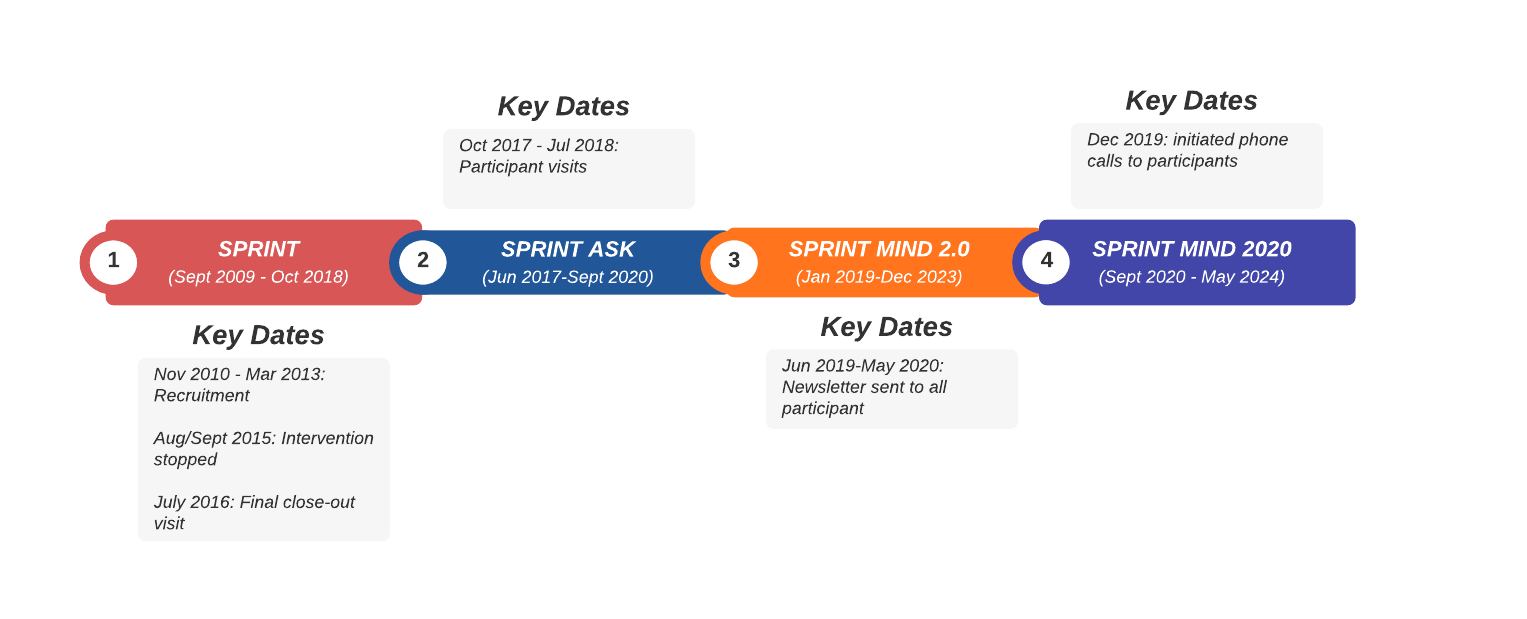SPRINT History
SPRINT was a ground-breaking research study funded by the National Institutes of Health to answer the following question:
"Will lower blood pressure reduce the risk of heart and kidney diseases, stroke, or age-related declines in memory and thinking?"
With high blood pressure being a leading cause of death and disability in the US and worldwide, and the number of people living with high blood pressure increasing, the NIH invested in a multi-center (102 sites), randomized (participants were randomly assigned to two different groups), research trial to compare two strategies for treating systolic blood pressure:
- The then current standard of <140 mm Hg and
- A more intensive goal of <120 mm Hg.
Why is a study like this needed?
While there were clinical research studies that showed managing high blood pressure could reduce cardiovascular disease outcomes (like stroke, myocardial infarction and heart failure), we did not know the best systolic blood pressure to attain for patients. Some observations studies showed that there was a progressive increase in risk of cardiovascular disease events as blood pressure rises above 115/75 mm Hg. But, would lowering blood pressure to <120 mm Hg could be harmful or at least not helpful and could be expensive. The NIH recognized that clarifying the best systolic blood pressure goal would be important to the health and well-being of the general population.
How did we do this?
Ninety SPRINT clinics across the United States and in Puerto Rice recruited more than 9,000 participants. All participants were seen regularly by experts in blood pressure management for a time span of 4 to 8 years. Participants had to be 50 years or older (no upper age limit) and have an average systolic blood pressure of ≥ 130 mm Hg and have evidence of cardiovascular disease and/or chronic kidney disease.
Why did we recruit patients who were at least 50 years old?
By age 50 years, a high systolic blood pressure is seen as the most common form of hypertension. In addition, it has been well documented that blood pressure, especially systolic blood pressure, is an independent risk factor for coronary events, stroke, heart failure, and chronic kidney disease.
SPRINT study staff were looking a myocardial infarction, acute coronary syndrome, stroke, heart failure or cardiovascular disease death. In addition, the study staff looked at all-cause mortality (death for any reason), decline in kidney function or the development of end-stage renal disease, incident dementia, decline in cognitive function and small-vessel cerebral ischemic disease. In short, we were following participants and managing their blood pressure while looking for issues with their heart, kidney and memory issues.
If you notice the end of the previous paragraph, memory was a significant part of the SPRINT study. A major study goal was to evaluate the impact of the systolic blood pressure management on decline in cognitive function.
Our first participant was enrolled on November 11, 2010 and reached the recruitment goal of 9,361 participants on March 15, 2013. We planned to follow participants until 2018 but the SPRINT trial was ended in 2015 earlier than planned due to the positive research data results!
What exactly did the results from the SPRINT study tell us? The SPRINT study found that lowering systolic blood pressure to 120 mm Hg (compared to the goal of 140 mm Hg) reduced the risk of major complications or death due to heart problems, including heart attack and heart failure by 30%! In addition, we saw an overall lower risk of death in the 120 mm Hg group.
Even though we ended the blood pressure portion of our study early, we continued the memory (cognitive function and dementia) portion of the SPRINT study for another year.
With funding ending for the SPRINT study but work remaining within the cognitive part of the study, the NIH in collaboration with the Alzheimer's Association, funded an extension of the SPRINT study, SPRINT Alzheimer/s, Senior and Kidney (ASK) study.
SPRINT ASK's goal was to obtain critical follow-up data and address important questions related to lower SBP goals; specifically, if lowering systolic blood pressure will reduce incidence dementia and mild cognitive impairment.
Beginning in 2017, we asked and YOU, our wonderful SPRINT participants, rose to the challenge of remaining in the study and agreed to one additional clinic visit and cognitive testing. SPRINT ASK showed that mild cognitive impairment can be significantly reduced by lowering systolic blood pressure. However, we did not have enough follow-up data for definitive results related to Probable Dementia; more time was needed to follow you, our SPRINT participants.
So, again the NIH stepped in and funded SPRINT MIND 2020. SPRINT MIND 2020 is providing the much needed follow-up data to help us gather more data on lowering systolic blood pressure and its effects on mild cognitive impairment and probably dementia.
